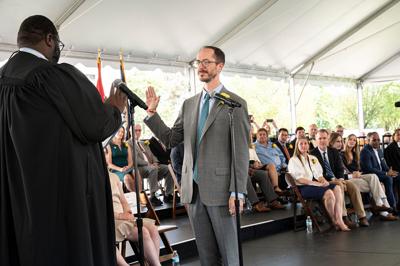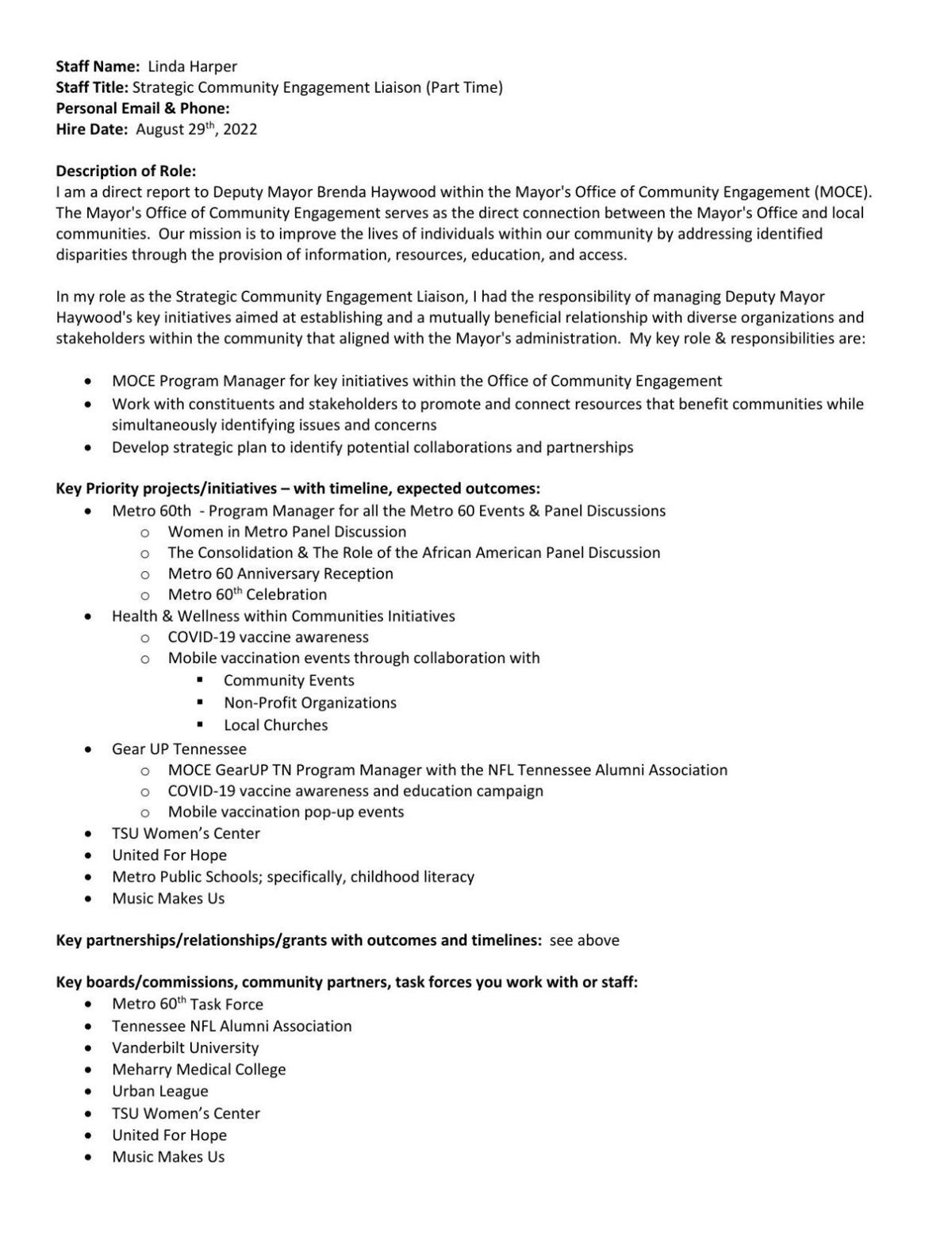Mayoral transitions in Nashville are short and, sometimes, messy.
After former Mayor John Cooper took over from David Briley in 2019, the new Cooper administration blamed the Briley team for a lack of funding for emergency cold-weather shelters. The exiled Briley team quickly shot back, producing a transition memo that listed handling the shelter situation as a top priority.
Four years later, after Cooper decided not to run for reelection, his top staffers have provided a similar service in the form of a stack of transition memos provided to the newly installed mayoral administration of Freddie O'Connell.
As detailed in the transition memos, released to Scene sister publication the Nashville Post in response to a public records request, Cooper's team thinks the O'Connell administration should be paying attention to several key issues.
Some of the memos — 19 were released — are more detailed than others. Top Cooper aides like senior adviser Ben Eagles, chief of staff Jennifer Rasmussen-Sagan and Deputy Mayor Sam Wilcox each took less than a page to sum up their responsibilities and remaining priorities. (Eagles and Wilcox both promised project-specific memos, which have not yet been released as part of the records request.) Meanwhile, Steve Lopez, tasked with tracking Metro department performance via data, predictably had among the most detailed and specific filings.
Here are some key findings from the released memos:
The memo from Fabian Bedne, senior manager of community development under Cooper, was among the longest. Part of his job was overseeing the city's participatory budgeting program, and his report details both remaining issues with previous PB rounds and what's left to manage the ongoing citywide voting for the latest round of funding. Some of the spending from previous rounds is held up, Bedne wrote: A land purchase related to the library in Bordeaux is delayed because the seller has not accepted the offer; no community partner has stepped up to manage a proposed community garden at the Looby Community Center; Metro Parks has identified issues with planned upgrades at Hartman Park at Bordeaux Gardens; beautification at Hadley-Lillard Park has been defunded due to unforeseen issues with allowable plants.
Bedne's role was expansive. He also detailed some ongoing projects with Nashville's library system. Bedne wrote that retired Nashville Public Library Director Kent Oliver wanted the mayor's office to focus on improvements to libraries at Hadley and Richland parks. Metro Parks has some issues with a plan for improvements at Hadley, so that project is on hold.
"Kent Oliver had a vision of constructing a larger library in [Richland] Park, but Mayor Cooper, who prioritized the preservation of green spaces, opposed the idea," Bedne wrote. "Instead, he suggested renovating the Cohn building and integrating the library within it."
Bedne wrote that, per Cooper's suggestion, he developed "a Cultural Campus concept" for the school building and the surrounding area. The school system "never granted the necessary approval to proceed" and so the project is currently on hold.
Bedne also notes that city officials have hit a wall in efforts to acquire the historic Morris Memorial Building downtown. "Several constraints hinder its practical utilization," Bedne wrote, including the cost of removing asbestos and other contaminants, limits on building higher at the site and limited parking in the area.
Ginger Hausser, senior adviser for intergovernmental affairs, was tasked mostly with serving as a conduit to regional, state and federal governmental officials. The role is among the administration's most important, given ongoing fights between the city and state over various pieces of legislation, though that simmering dispute goes unmentioned in Hausser's transition memo. Hausser does note that the mayor's office should be spending the fall determining state legislative priorities ahead of the January return of regular session. Whoever succeeds her, Hausser wrote, should have the "ability to pass, kill or amend legislation" and "build relationships and coalitions to support the city and the mayor."
Kendra Abkowitz, chief sustainability and resilience officer under Cooper, is staying on with the O'Connell administration. She wrote in her transition memo that a key priority is "analyzing the impacts of forming [a] standalone Waste Services department." O'Connell has hinted at that effort, telling reporters after his swearing-in that "it will probably be at least a year effort to get all of the legal arrangements and staffing arrangements to make solid waste not a part of our Metro Water Department anymore."
Abkowitz also wrote that a drafted open-use policy for Metro Nashville Public Schools recreation sites was "placed on pause due to [the] Covenant shooting." Among her other priorities: Awaiting news on grant applications for funding to model flooding on the East Bank and to upgrade electric vehicle charging infrastructure. She also expects continued conversations around dedicated funding sources for both transit and parks.
La'Kishia Harris, associate director of youth workforce, economic opportunity and community development, has several recommendations for the O'Connell administration. She wrote that the city should work to expand the new Out-of-School Locator, a tool for parents to find after-school activities for kids. She also said the city should remain focused on the development of the Darrell S. Freeman Sr. Incubation and Innovation Center at Fisk University, the Hey Girl! program for young women and the Mayor's Youth Council.
Mike Jameson, director of legislative affairs, has five recommendations for the new administration: O'Connell should meet with every Metro councilmember and every member of the state legislative delegation at the beginning of the term and then throughout the term; the mayor's office and Metro Legal should begin discussing state legislation priorities now; the deadline for distribution of Metro Council amendments should be moved up so that the administration has more time to analyze them; Metro Water infrastructure legislation should be adopted by resolution rather than ordinance to save time; and the mayor's office should have two people as Metro Council liaisons.
Cooper's deputy director of community safety, Mike Lacy, listed several key priorities moving forward related to violence prevention and reduction.
"It is vital this is maintained, even if utilized by other part[s] of Metro Government, as our expenditures in this domain are woefully under resourced," Lacy wrote. "All major reputable law enforcement agencies and policing think tanks are aligned that law enforcement empirically is not part of government which prevents crime, they are the agencies which respond to it. A reduction in violence only comes from services that prevent the pre-conditions of crime, and the most effective ones target those most likely to [be] engaged in or victims of violence. ... In addition to funding, the political will and coordination need to be in place to make these programs successful."
This article was first published by our sister publication, the Nashville Post.






